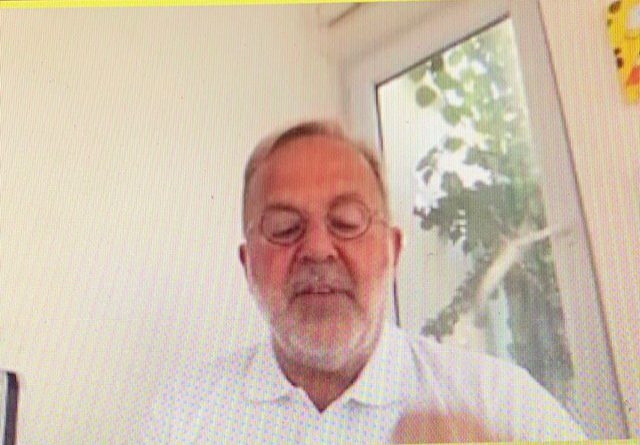Blockchainarmy Founder President EROL USER shined at EURAS WEBINAR
 Blockchain and New Technologies Webinar organized by EURAS(Euroasian Universities Union),Aydin University,Accra Technical University and The Hague University was held last Friday.
Blockchain and New Technologies Webinar organized by EURAS(Euroasian Universities Union),Aydin University,Accra Technical University and The Hague University was held last Friday.
Webinar moderated by the legend Professor of Economics Sedat Aybar with the guest speakers Erol User Blockchainarmy Founder President,Dr Ernest Christian Winful of Accra University,Dr Irenee Dondjlo of The Hague University and 3800 participants.
Blockchainarmy Founder President Erol User focused on the use of Blockchain in many fields of the life.
“Blockchain is the digital, distributed, and decentralized ledger underlying most virtual currencies that’s responsible for logging all transactions without the need for a financial intermediary, such as a bank. In other words, it’s a new means of transmitting funds and/or logging information.
Why the sudden need for blockchain? Blockchain is the vision of developers who believed that the current banking system had flaws. In particular, they viewed banks acting as third-parties and pilfering transactions fees as unnecessary, and they scoffed at the idea that payment validation and settlement could take up to five business days in cross-border transactions. With blockchain, real-time transactions are a possibility (even across borders), while banks are left out of the equation entirely, presumably reducing transaction fees.
There are other uses for blockchain, too, beyond the currency setting. Numerous Dow Jones Industrial Average components are testing out some of these uses in small-scale projects and controlled demos .
You’re probably wondering what this potentially game-changing technology can actually do in the real world. Well, wonder no more. Here are 20 potential uses for blockchain technology.
- Payment processing and money transfers
Arguably the most logical use for blockchain is as a means to expedite the transfer of funds from one party to another. As noted, with banks removed from the equation, and validation of transactions ongoing 24 hours a day, seven days a week, most transactions processed over a blockchain can be settled within a matter of seconds.
- Monitor supply chains
Blockchain also comes in particularly handy when it comes to monitoring supply chains. By removing paper-based trails, businesses should be able to pinpoint inefficiencies within their supply chains quickly, as well as locate items in real time. Further, blockchain would allow businesses, and possibly even consumers, to view how products performed from a quality-control perspective as they traveled from their place of origin to the retailer.
- Retail loyalty rewards programs
Blockchain could further revolutionize the retail experience by becoming the go-to for loyalty rewards. By creating a token-based system that rewards consumers, and storing these tokens within a blockchain, it would incentivize consumers to return to a certain store or chain to do their shopping. It would also eliminate the fraud and waste commonly associated with paper- and card-based loyalty rewards programs.
- Digital IDs
More than 1 billion people worldwide face identity challenges. Blockchainer is looking to change that. It’s creating digital IDs within its Authenticator app — currently used by millions of people — which would give users a way to control their digital identities. This would allow folks in impoverished regions to get access to financial services, or start their own business, as an example. Of course, Microsoft’s attempts to create a decentralized digital ID are still in the early stages.
- Data sharing
Cryptocurrency IOTA launched a beta version of its Data Marketplace in November, demonstrating that blockchain could be used as a marketplace to share or sell unused data. Since most enterprise data goes unused, blockchain could act as an intermediary to store and move this data to improve a host of industries. While still in its early stages, IOTA has more than 35 brand-name participants (with Microsoft being one) offering it feedback.
- Copyright and royalty protection
In a world with growing internet access, copyright and ownership laws on music and other content has grown hazy. With blockchain, those copyright laws would be beefed up considerably for digital content downloads, ensuring the artist or creator of the content being purchased gets their fair share. The blockchain would also provide real-time and transparent royalty distribution data to musicians and content creators.
- Digital voting
Worried about voter fraud? Well, worry no more with blockchain technology. Blockchain offers the ability to vote digitally, but it’s transparent enough that any regulators would be able to see if something were changed on the network. It combines the ease of digital voting with the immutability (i.e., unchanging nature) of blockchain to make your vote truly count.
- Real estate, land, and auto title transfers
One of the primary goals of blockchain is to take paper out of the equation, since paper trails are often a source of confusion. If you’re buying or selling land, a house, or a car, you’ll need to transfer or receive a title. Instead of handling this on paper, blockchain can store titles on its network, allowing for a transparent view of this transfer, as well as presenting a crystal-clear picture of legal ownership.
- Food safety
Yet another intriguing use for blockchain could be in tracing food from its origin to your plate. Since blockchain data is immutable, you’d be able to trace the transport of food products from their origin to the supermarket. What’s more, should there be a food-borne illness, blockchain would allow the source of the contaminant to be found considerably quicker than it can be now.
- Immutable data backup
Blockchain might also be the perfect way to back up data. Even though cloud storage systems are designed to be a go-to source for data safekeeping, they’re not immune to hackers, or even infrastructure problems. Using blockchain as a backup source for cloud data centers — or for any data, as Boeing is considering with GPS receivers on its planes — could resolve this concern.
- Tax regulation and compliance
Have I mentioned how important transparency and immutability are yet? For example, marijuana companies can use blockchain as a means to record their sales and demonstrate to lawmakers that they’re abiding by local, state, and/or federal laws. More importantly, these sales act as a clear record for the IRS that they’ve paid their fair share of taxes to the federal government, assuming they’re profitable.
- Workers’ rights
Another interesting use for blockchain is as a means to bolster the rights of workers around the globe. According to the International Labor Organization, 25 million people worldwide work in forced-labor conditions. Coca-Cola, along with the U.S. State Department and other partners, is working on a blockchain registry complete with smart contracts — protocols that verify, facilitate, or enforce a contract — to improve labor policies and coerce employers to honor digital contracts with their workers.
- Medical recordkeeping
The good news is the medical sector has already been moving away from paper for recordkeeping purposes for years. However, blockchain offers even more safety and convenience. In addition to storing patient records, the patient, who possesses the key to access these digital records, would be in control of who gains access to that data. It would be a means of strengthening the HIPAA laws that are designed to protect patient privacy.
- Weapons tracking
One of the hot-button topics on any news network at the moment is gun control and/or weapons accountability. Blockchain could create a transparent and unchanging registry network that allows law enforcement and the federal government to track gun or weapon ownership, as well as keep a record of weapons sold privately.
- Wills or inheritances
Blockchain may also be able to put your end-of-life concerns to rest. Rather than creating a paper will, people may have the option of creating and storing their digital will on a blockchain network. When used with smart contracts, which could divvy out inheritances based on when certain criteria are met (such as when a grandchild reaches a certain age), wills should become crystal clear and legally binding, leaving no questions as to who should receive what assets when you pass away.
- Equity trading
At some point, blockchain could rival or replace current equity trading platforms to buy or sell stocks. Because blockchain networks validate and settle transactions so quickly, it could eliminate the multiday wait time investors encounter when selling stock(s) and seeking access to their funds for the purpose of reinvestment or withdrawal.
- Managing Internet of Things networks
Networking giant Cisco Systems may be behind a blockchain-based application that would monitor Internet of Things (IoT) networks. The IoT describes wirelessly connected devices that can send and receive data. Such an application could determine the trustworthiness of devices on a network — and continuously do so for devices entering and leaving the network, such as smart cars or smartphones.
- Expediting energy futures trading and compliance
Even the energy industry is getting in on the act. Similar to the benefits it could bring to equity traders above, blockchain offers the ability to help energy companies settle futures trading considerably faster than they currently do. It’s also worth noting that blockchain could help energy companies with regard to logging their resources and maintaining regulatory compliance.
- Securing access to belongings
Smart contracts within blockchain networks also have the ability to be customized to a businesses or consumers’ needs. As a consumer, you could use blockchain as a means to grant access to your house for service technicians, or allow your mechanic access to your car to perform repairs. But without this digital key, that only you possess, these service technicians wouldn’t be able to gain access to your belongings.
- Tracking prescription drugs
Finally, blockchain could be a means of transparently tracking prescription medicines. In a world where prescription returns do occur, and counterfeit medications are a real thing, blockchain offers drugmakers the ability to track their products based on serial and/or batch numbers to ensure that consumers are


